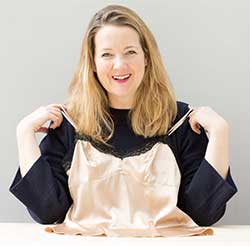MIM QUIN-HARKIN

Local stylist takes the plunge with lingerie start-up.
Interviewed by Jo Reynolds
How long have you lived here?
Two and a half years. I'm quite new but I love it.
What do you like about it and where do you hang out?
I love the diversity. And the open skies – there aren't too many tower blocks. When you drive down Uxbridge Road you feel like you're heading to new horizons. I love the Nut Case on Uxbridge Road and Caco, the new Portuguese place on Askew Road.
I always follow my heart
What's your business background?
My first job was working for my father. On weekends he did up and sold old Citroëns, 2CVs and DSs. We – my brother and sister too – answered the phone and made appointments. We didn't get paid. My first paid job was a Saturday job in a hat shop in Cirencester (in Gloucestershire) where w¬e lived. Dad's proper job was at Lloyd's Insurance. Every day he commuted to the City to the Richard Rogers building where I got my first proper job as an Underwriter's Assistant in an aviation syndicate. We insured private planes, like Cessnas. I loved it – such lovely people, and from all walks of life – but I always wished I'd gone to art school. Both my parents were creative. Mum worked for an art dealer in Notting Hill. After Lloyd's I moved into fashion and was Jeff Banks's PA and worked for the Per Una brand. Before Per Una I'd been freelance as a photographer's stylist, working on amazing advertising shoots, which I still do and love. All the prop houses are in Acton, which is one of the huge benefits of living here.
What gave you the idea for your lingerie business?
I was a bit podgy as a girl and felt more comfortable covering my tummy. I still do. My gran gave me her slips and chemises. I loved wearing them over bra and knickers. But I'm not just offering undergarments. They're designed to be versatile and can be worn as you want.
What are you starting with?
The launch collection covers the key pieces that work with any wardrobe as underwear or as a top or dress. Essentially it's a range of camisole vests and slips of various lengths, mid-thigh or knee or floor-length. They can be worn under your clothes to create a flattering silhouette and protect your clothes, or keep you warm. They're lovely to sleep in – perfect for a weekend away. And we can make most colours bespoke. They're designed to be seen – with beautiful lace trims.
Why the name Parasol Rose?
A parasol offers protection and rose petals are soft as silk. Everything's made of silk and natural fabrics. I think only natural fibres should be next to your skin.
Are you good with a needle?
I'm useless. And I'm scared of sewing machines. I always think the needle's going to go through your finger. I did night school in shoemaking and was told my shoes were the worst they'd ever seen. I'm rather stubborn – I'm Taurean and born in the year of the ox – so I did another course in hat making. I like millinery because you can hide your stitches more easily. No, sewing eludes me which is why I'm so delighted to have such a talented team: my designer and pattern cutter and the manufacturers – they're all experts and based here in the UK.
How did you research the market?
I spent ages researching the underwear sector and canvassed my friends. Some of them thought I was bananas trying to launch what they saw as museum clothes but I love vintage and I can see them becoming tomorrow's vintage-inspired favourite. In the end, I just decided to give it a go. Everyone who's bought a piece loves it and cherishes it and comes back for more.
Are pop-ups the future of shopping and will they kill the high street?
Most high streets are already under pressure and offer a very similar choice. I like going to places that have an identity that’s relevant to the people who live there. If that is created by having a changing pop-up culture, then yes, I think it will be more interesting to the customer. It would be wonderful if we could recreate the experience that shoppers must have felt when walking into the first department stores, those wonderlands.
Have you always been entrepreneurial?
I always follow my heart. I like adventures in life.
Is it the biggest risk you've ever taken?
I don't see it as a risk because I don't feel I have any choice but to try and see it through. My biggest risk was leaving full-time employment years ago, but I love working for myself. It makes me feel free. I have to work slowly due to money restrictions. It would be great to find an investor like Anita Roddick's (Body Shop founder). She reputedly got backing from her accountant who left her in peace and she handed him 146 million as a thank-you.
What does it cost to start up in fashion?
A lot more than you think. It's expensive, especially using quality materials.
What's the goal? Sell to LVMH (the mega brand owners)?
It's important to me to have a success, but I'd like to hang on to it.
Any advice for an aspiring fashion entrepreneur?
Treat everything as if it matters because quality is everything: fabric, fit and feel. Only risk the money you can afford to lose, but just get started.
Thank you, Mim. It's been a real pleasure to meet you.
Interviewed November 2016
Headshot by Teresa Walton © teresawaltonphotos.com